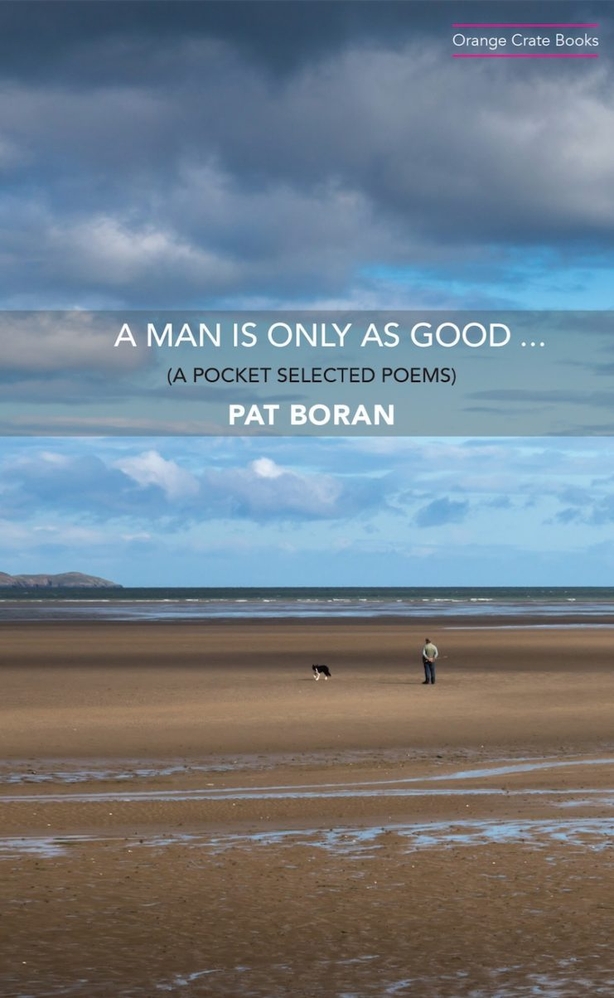Us humans, we will never see the greater picture because of our limitations - yet these masterful, intelligent poems from Pat Boran will nevertheless fit and endure in the frame.
Career development can be delineated through this 148-page selection but one of the best poems in the book, Have You Left Mountmellick for Ever? from The Unwound Clock (1990) is a gushing spring of youthful longing.
The convent has me drunk on wine/uniforms, Maguire’s dog snaps a trap/of teeth through their gaudy fence.
In later poems, the more circumspect poet may focus on an activity, tease it and test it, as though bending a hurl against the ground to examine its flexibility. Learning to Dive is particularly striking in this regard, a poem that dallies with male rites of passage. Dave Hannigan’s recent, excellent memoir of a Cork City childhood, Boy Wonder, devotes its entire opening chapter to a vivid description of the exact same situation, the first dive from on high into water that seems so far below. The poem is loaded with high-board tension and anxiety, but happily nobody lands the wrong way. Indeed, the poem concludes with quiet triumph as the subject
at last steps clear/to fall/away into the rapturous applause / Of water, each glistening drop/ a medal struck to honour/ the triumph of his simply letting go.
In Skipping, the poet narrator espies a girl skipping, where once again modest triumph, that mastery over a small patch of gravity perhaps, builds towards the climactic few lines:
On she goes, skipping and leaving the world/ over and over, loving/ the weight of herself, her weightlessness,/ the swoosh of the rope.

Intruder is a powerful record of an uneasy, late-night confrontation between the poet-narrator and the young would-be intruder of the piece. The latter may well have been planning a burglary of some kind, it is not entirely certain, the poet-narrator cannot assume anything, sin cannot be sin without full knowledge. The poem riffles through such shifting moral high ground but it is more than a parable, as it evokes the sensual garden, the tendrils of clematis/ inching up through the stars...
In this perfectly-wrought poem, Boran skilfully knits two separate fears into one skein of what is the same human response of fear. Intruder and occupant have much in common, both their skin superficies are `bristling with gooseflesh.’
In such poems, the Portlaoise man can place a given scenario on the page and then be the devil’s advocate, as it were. More than most Irish poets writing today, Boran wants you to think as you finish his verses, sometimes to think very hard indeed. Children is the bittersweet, mildly disturbing poem that turns things completely on their head - to paraphrase it is to upset its delicate verities. Children, as the poem posits, send tiny adults into minefields, barefoot with pictures/of Khomeini around their necks,/ their old toes searching the sand/for death.
That is a haunting line, but Pat Boran’s gift in such poems arises not from any wish to shock - rather, he wants to confront human predicaments and draw conclusions, however finite and unresolved they may be. He can juxtapose analytical sharpness with attention to the world of the senses and let the two contend in a poem. But he can just as easily dispense with topicality and veiled analysis altogether and write Lost and Found, an elegy for his father, taken from As the Hand, the Glove (2001), a poem which has apparently touched many hearts and prompted quite a few letters to the poet. AM is another poem, a mere ten short lines, also recalling his late father. The tone is pithy and wryly purposeful, no less effective than the more emotionally invested Lost and Found, which begins as follows:
Sometimes now I see my father/ up in Heaven, wandering around/ that strange place where he gathers up/ what other souls no longer want, / as all his life he gathered / unloved things.
The sentiment in the elegant poem Unbuild - from the same collection - may prove wearily familiar to anyone who misses the atmosphere, the smells and the still-sad music of a long-gone family home. Boran nails it, the way we can only possess the lost eden of home and hearth by letting it play on the banks of our warbling memory rivers.
And now when night falls/I go back again/ to unbuild the house.
Take too the remarkable poem Tears, in which the authorial voice is blankly self-obsessed. Yet the rolling, ballad-like canter links author and reader with its recognisable kernel of sadness, deliberately heightened though the tone may be.
Prefaced by a perceptive essay on the work by esteemed poet and critic, the late Denis O’Driscoll, A Man is only As Good... deserves to be lifted from many’s the pocket, by those wishing to intrude on Pat Boran’s singular dwelling place.







